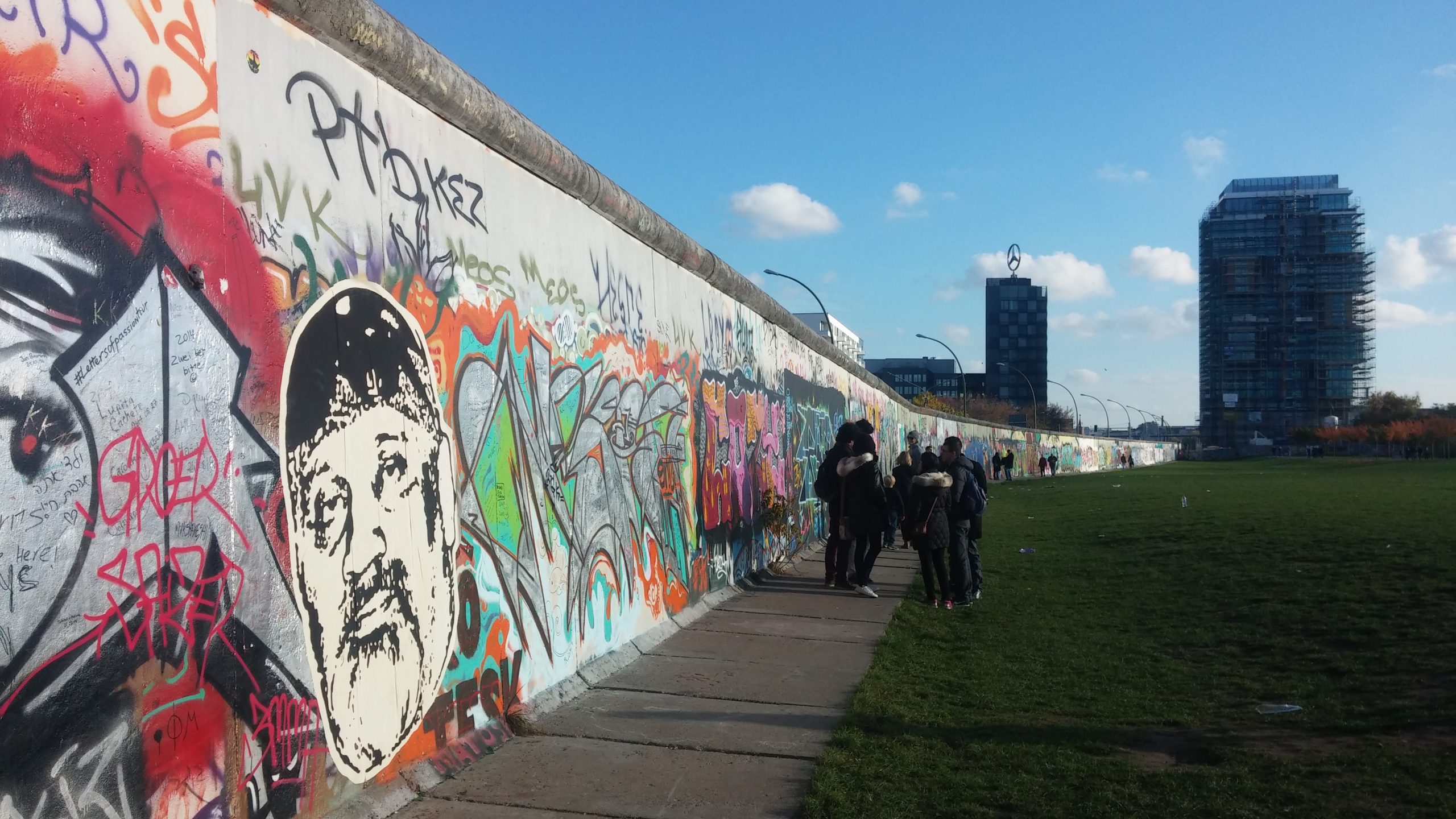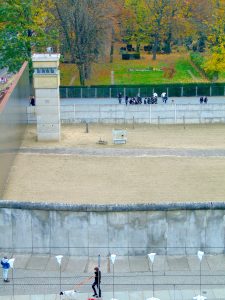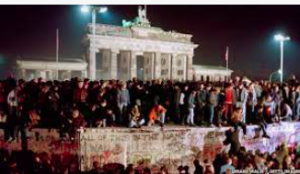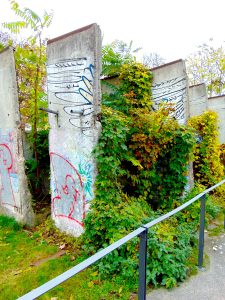
The remaining mile of the Berlin Wall, serving as the East Side Art Gallery, onto which images of freedom are painted. (Photo by Jim Willis)
(A portion of this comes from a story I wrote as a reporter covering the 10th anniversary of the fall of the Berlin Wall, in November, 1999.)
The timing of a mistaken announcement, confusion at a checkpoint, and the will of a people to seek freedom spelled the end of the Berlin Wall.
Fate has given the world times when large groups of loved ones, cut off from each other for decades by government oppression, are rejoined unexpectedly because of a moment when all the right pieces fall together serendipitously.
Case in point: Berlin, November 9, 1989.
The Monster
To the Ossis, it was a monster, standing menacingly between them and freedom. To the Wessis, it was a constant reminder that a third of their homeland had been abducted, possibly forever.
Feared and loathed for years by East Germans and West Germans alike, it was one of the defining symbols of communism, whose collapse in 1989 stunned the world.
The monster was the Berlin Wall, a concrete barrier that had divided a nation but also served as a reminder of a barrier between worlds.
On the night of Tuesday, November 9, a crowd of 40,000, which included 1,000 youths who were in town for a European Youth Festival, helped mark the anniversary of the collapse of the Berlin Wall (the Mauerfall as the Germans say it), as they gathered beneath the historic Brandenburg Gate.
The blink of an eye
Like a singer who labors for years in obscurity and then lands the break making her an overnight success, the Berlin Wall vanished November 9, 1989, in the blink of an eye that took almost three decades to shut.
Harald Jaeger
To many Germans, Harald Jaeger is the man who opened the Berlin Wall. To others, long waiting for the Wall to fall, it was proof that timing is everything.
Jaeger was an East German lieutenant colonel in charge of his Bornholmer Strasse checkpoint on the night of November 9. On that night, partly in a moment of confusion and partly out of frustration and fear of a riot, he stood back and allowed the first of thousands of East Germans to pour across his checkpoint into West Berlin, and freedom.
Jaeger has often been said, “I didn’t open the wall. The people who stood there, they did it. Their will was so great, there was no other alternative but to open the border.”
With that decision, 28 years of East Germany’s isolation from the West came to an abrupt end. To be sure, there were many years of international negotiations that had preceded this night, but those talks had always come to a stalemate.
Perfect timing
On this night, however, the timing was perfect for a long-oppressed people to risk facing down a disillusioned border guard colonel and punch out the monster of the Berlin Wall.
These East Germans had gathered at Jaeger’s checkpoint after they heard a government minister, Gunther Schabowski, announce (mistakenly as it turns out) that East Germans could cross into West Germany immediately.
Col. Jaeger heard the announcement while eating supper and was shocked by it. There had been no indication this was coming. It was such a stunning announcement that he raced to his office to get confirmation and to receive orders on what he and his border guards should do now.
His shocked reaction was understandable. If this order were true, nearly three decades of East German policy about “protecting the people from the fascism of the West” by keeping them inside the Wall was upended.
If Jaeger was confused, the people of East Germany were not. They had just heard a member of the country’s ruling party say they were free to walk past the Wall and into the West.

A guard tower looms over a segment of the infamous “death strip” between the inner and outer boundaries of the Berlin Wall. (Photo by Jim Willis)
Tension rises
Still awaiting a response to his request for orders, Jaeger was at his Bornholmer Strasse post where he was confronted by about 20 East German citizens who had hears the announcement and demanded to be let through the checkpoint.
Before long, the numbers grew dramatically and within a few hours, the 20 had grown to some 10,000, and they began shouting to “Open the gate!”
Still no confirmation came of Schabowski’s announcement, nor did any orders to shoot people if they tried to cross the checkpoint. This despite the fact that official records showed that 135 East Germans had been shot for trying to illegally pass this sector over the past 28 years.
Plan backfires
Finally, Jaeger’s superiors told him to defuse the situation at the checkpoint by allowing just some of the noisier people through the gate but to stamp their papers in such a way that they wouldn’t be allowed back into East Germany.
That tactic failed miserably as the crowd saw those before them pass through. It was clear the crowd wasn’t going to leave without a fight.
Jaeger was caught in the middle with pressure from above to avoid a riot, while also disallowing the passage of anyone else through the gate. Jaeger did the only thing he felt he could do. He ordered his guards to stand down and let the crowd pass through.
It never closed again
Once that door opened, it never closed. Word quickly spread through the city that Bornholmer Strasse was open to the West, and thousands more came and passed through unharmed. Before the night was over, more than 20,000 East Germans were walking the streets of West Berlin.
Once the floodgates were open, they never closed as the government bowed to years of mounting pressure from the people and from the West. The fall of European Communism would fall soon, and Germany would be officially reunited into one country.
But on this particular night, November 9, 1989, there was only the euphoria of a pent-up people embracing the sweet taste of freedom.
Images streamed around the world of elated East Germans dancing in the streets of West Berlin and hugging their long-lost relatives and friends.
Nearly three decades of government negotiations had failed to accomplish what a single night’s serendipitous timing did.
I am a writer, college professor, and author of several nonfiction books, including three on the decade of the 1960s. Several wonderful essays of gifted Retrospect authors appear in my book, "Daily Life in the 1960s."






I had to look up Harald Jaeger to see what happened to him after that fateful night. He remained safe although unemployed, living out his remaining years in his beloved East Germany home. Yes the will of the people toppled that wall, but Jaeger definitely became a protective doorway between. That they were there, that he was there, in an historic blink of an eye…
Thanks for the comment, Patty. Jaeger remains as one of those everyday people around whom history pivots because of one night’s timing. The right guy was there at the right time.
Thank you for this important look at a historical moment in time (and how cool that you were there to cover the 10th anniversary of the event). People yearn for freedom, no matter what the circumstances and will relish it, once attained. This is the proof. Your story reminded me of the old movie “The Spy Who Came in From the Cold”, made before the collapse of the wall. It does not end so happily.
Thanks, Betsy, and that’s a real classic of a movie!
Such a humanistic story. Thanks.
BUT I taught Reagan tore down the wall. LOLz
How can this event influence future policy: Trump’s wall.
Thanks, Richard. The 25th anniversary focused on the power of the people that made it happen.
This story reminds us how change can come suddenly, after years of assuming it never could. The events that followed in 1989 were similarly stunning. Thanks for a great story, including the back story I never knew.
Thanks, Khati. I agree with you about change and its tempo. I thought of that when I wrote my story back in ’99, using the simile of the singer who labored in obscurity for so long before becoming an overnight success.
Thank you for this amazing history lesson, Jim. So interesting that it was confusing orders and timing that brought down the wall, not Ronald Regan.
Jaeger’s willingness to let it happen without a bloodbath is particularly remarkable, because I get the impression that people raised and living in a totalitarian system are simply less prepared to think on their feet and disobey orders. Of course he also realized that he and his guards would probably have been torn apart as soon as they ran out of ammo.